When creative minds come together with the passion and desire to collaborate nearly anything is possible. That’s what happened when playwright Jenelle Riley took a step back from her day job as Features Editor at Variety to write a screenplay for a short film while enlisting the help of her equally talented friends Jennifer Morrison who rose to the challenge of first-time director along with seasoned producer Andrew Carlberg.
Their labor of love started as an idea from a 24 hour event at a local LA theater company which later blossomed into WARNING LABELS, a quirky nontraditional romantic comedy about a couple of employees from the Centers for Disease Control (CDC) and their misguided views about love.
Recently I had the pleasure of interviewing Jenelle, Andrew and Jennifer to discuss their short film and the exciting road to Tribeca. WARNING LABELS is set to premiere at the Tribeca Film Festival Saturday, April 18th in New York.
Can you talk about where the idea for your film WARNING LABELS came from?
Jenelle Riley: I’ve kind of gone through these phases, I went through that phase where you sort of write what you think is very daring and edgy stuff that might offend some people; you try to push buttons and see how far it will go. That was funny stuff and it was fun but in the last couple years, probably more like the last five or six years, I really have been gravitating more towards romantic comedies which is one of my favorite genres. I don’t think it gets the respect quit often that it deserves.
At a New Years Eve Fast and Loose (an event that takes place at Sacred Fools Theater Company in LA where a new play is created within 24 hours) they gave out warning labels for people to inspire people to write their pieces and a self-descriptive word.
So for example there was a warning label that said “Wearing of This Garment Does Not Enable You to Fly”. My warning label was “Keep Dry Out of Sunlight and Chemicals” and my self-descriptive word was “Problem Solver” and I had two men and two women which is my dream because there’s a great romantic quadrangle that you can do with that. I was having trouble coming up specifically with “Keep Dry Out of Sunlight and Chemicals” and I just kind of got fixated on this idea about warning labels and came up with the idea of what if we all had to wear warning labels that described all of us. One of those peoples warning labels was problem solver or something along those lines.
I started to write this piece about a girl who wears a warning label that says “Warning Danger Ahead” and underneath there are all these descriptions like “Keep Dry Out of Sunlight and Chemicals” and it naturally, I say naturally but at the time I’m sure I struggled, I came up with this idea of two people who were kind of perfect for each other but they’re both with the wrong person and treat it like hey this is the world in which we wear warning labels and not make a thing of it. You know just be like this is the universe in which this exists and everybody wears a little label that says something and kind of go from there.
Since your film WARNING LABELS is a short could you give a little breakdown of what its about without giving too much way?
JR: Sure. There are two coworkers at the Centers for Disease Control (CDC) and they meet up one night and the man is hoping to make a connection with this woman and instead she brings along her boyfriend and they try to set up the guy with another girl. They all live in this world where they wear warning labels that sort of describe them and things unfold from there!
What was it that drew you to this project?
Jennifer Morrison: I am a fan of Jenelle Riley’s writing. She is a good friend and I have seen several of her plays. She has a great combo of big catchy ideas with honest heart and meaning running underneath them. I felt like WARNING LABELS was a story of self-discovery and the difficulties of human connection. I was intrigued by exploring these ideas within a stylized world.
You have an impressive group of incredibly talented people connected with the film (Karen Gillian, Rose McIver, Eric Christian Olsen, Josh Lawson). How did everyone become involved with the project?
JR: Well I’ve been good friends with Jennifer (Morrison)…gosh I think we met in the first Season of House. I never do this, I never meet people and say hey check out my movie but I had just done a short film that kind of spun off from Fast and Loose called Instant Films where you had 48 hours to make a movie and a lot of the same people involved in Sacred Fools do Instant Films as well. I had, not surprisingly, written a romantic comedy called CRAZY LOVE that got made in 48 hours that so exceeded my wildest expectations.
Writing, shooting and editing a movie in 48 hours and you don’t know who your cast is going to be you just hope to entertain people. My director that I drew at random was John Cabrera who actually used to be on Gilmore Girls. So I was very proud of this movie and I gave it to Jennifer at one point and she was a real fan of it. We sort of collaborated on little things over the years and so we’ve been wanting to work on something together for a long time.
I did this play around two years ago called A KIND OF LOVE STORY that I wrote and directed for Sacred Fools and it was very naturally meant to be a movie. Everyone says when are you going to do a film version of that so we started working on that together and the idea was let’s make a short film with the same team, our producer Andrew Carlberg and Jennifer and I just to sort of show people that this was the tone we were going for because a lot of my stuff tends to take place in I don’t want to say alternate universe but the funny thing is I’m not a fan of Wes Anderson but I get compared to him a lot [laughs] so you could see Wes Anderson having a world where everyone had to wear warning labels.
So the idea was to do WARNING LABELS to kind of have a calling card to show people along with the script for A KIND OF LOVE STORY.
JMo: Karen (Gillian) and Rose (McIver) are both very close friends of mine. I met both of them through previous projects as an actor. They are the real deal those two. I have so much respect for both those ladies. Tamara Notcott (the casting director) was hugely instrumental in securing Josh Lawson. He was the only cast member I had never met before. He officially said yes to doing the film on my birthday. So technically, he was my birthday present.
Eric Christian Olsen was the only guy I could imagine playing Thad. I needed Thad to be lovable despite the things he is saying and doing in the film. Eric has this insatiable charm and impeccable comic timing. He and Josh riffing off of each other was magical. Eric is a close friend of Andrew Carlberg, and he and I met years ago playing poker at a FOX event.
As with any passion project, we were very lucky that so many people willingly did us favors. The crew was incredible, both camera teams were incredible. The DP, Djordje Arambasic, came to me through the co-producer Ashley Lent. She used to work for SUNDANCE and she was blown away by a film that he worked on in 2013. She put us in touch and it was an immediate an obvious fit.
Short films are built on passion, personal relationships, and kind favors.
What were some of the challenges in getting this film made?
JMo: An early obstacle that we faced on WARNING LABELS was finding the diner location that we needed for filming. We discovered that diners are always open which makes them very expensive to buy out for filming. We also needed to have a specific geography to the tables in the diner because of the tackle that happens in the blocking. We scouted countless diners in the LA area. We drove as far as we possibly could within the technical filming limits that are considered Los Angeles. We could not afford to buy the spaces that were cinematically suited for the style of the film. Overcoming this problem involved bringing on an additional producer (Andrew Kelly).
Initially his main task was extensively scouting diners. In the end, he contributed in every area and was a priceless addition to the team. With his help and previous location scouting experience, we found a very simple diner that allowed us to prep the space while the drive through was still open, and since they only serve breakfast on Sundays, they closed at 2pm on the day we filmed. We were allowed in the space for only 14 hours total including loading in and out. So we had 12 hours of actual filming time for 9 pages with 4 actors.
We painted walls and hung all new light fixtures in the space. (The owners liked the new lights so were able to leave those). Since we only had 12 hours to shoot 9 pages, I had a rehearsal the day before with the actors. We rearranged my kitchen to block and run the scene. The actors were completely memorized and had a strong sense of the blocking and the choices they were aiming for by the end of rehearsal so that the 12 filming hours we had were used entirely for set ups and filming. In addition to the small window of time we were allowed in the diner, we also had to shoot out one of the actors by 11pm.
Therefore we had to split a night shoot across half day-half night, and schedule his parts of the scene first. This meant initially blacking out all the windows of the diner and shooting the reverse master first in order to shoot away from the windows as much as possible until the sun went down. An obsessively detailed shot list that was shared with every department, combined with the actors’ preparedness, made it possible to over come the restrictions of the space.
When you write something yourself and you put it out there, just because you put the words on the page doesn’t mean you’ll have much control over the final outcome of the film. How involved where you with the overall process?
JR: That’s tricky because I don’t want to take credit because Jennifer and Andrew really did everything and are so amazing but they gave me as much involvement as I wanted. It was such collaboration and everyone was so wonderful and open to suggestions. Even the actors would come in and throw out lines or throw out ideas. Eric Christian Olsen is an improv genius. I’m an extra and at one point he says something to me and it was just so hard not to ruin takes. One of the biggest problems was trying not to laugh.
They let me be very involved but I also don’t want to take credit for being too involved because the script was done and they really ran with it. It’s funny because I was there on set but I don’t have the greatest visual eye when it comes to film and so I was there and saw what they were doing and it looked really good. When I saw the camera movement and how it was lit and all these little touches and the editing I was really blown away.
What was your reaction when the film was completed and you got to see a final cut?
Andrew Carlberg: It was so strong to begin with and a lot of that has to do with our all-star editor Joe Hall. I’m amazed at how consistently even our trailer…how consistently the first thing he turns out is so close to the finished product. I loved it and I worked with a lot of playwrights and I liked the sweetness. The romantic comedy aspect of the writing is something I don’t often get to do. Seeing the comedy played out in that way, all the performances were great and when you’re doing it you’re kind of disjointed when you’re actually shooting. To see the actual product come together was thrilling.
JMo: It is a long journey from filming to seeing a final cut. I was the most nervous before seeing the first editors cut. I was so relieved when I saw it. It was absolutely the foundation that I wanted to start from editorially. I also knew immediately that Joe Hall was my guy. I honestly cannot imagine ever doing a film without him. We have such similar sensibilities and he directs as well, so he thinks like a director. I feel like we can communicate through grunts and sighs at this point.
You’re one of the leads of an ensemble cast in a successful series. Between shooting schedules, appearances to promote the show and other industry events, how did you find the time to not only make a movie let alone direct one?
JMo: When passion drives a project, somehow it all seems possible. I spent every spare second of Season 3 of ONCE researching directors that I love and building a list of references and inspiration for WARNING LABELS. I ended up doing most of my real prep while I was working on the film LOCKED IN as an actor. I took a lot of meetings at my cast chair. Thank God for iPhones. Lots of FaceTime, Skype, email, texting, shared Dropbox folders. I also had a very specific directors statement from the beginning that helped point everyone in the right direction. This was crucial since my face-to-face time with everyone was so limited. Andrew Carlberg and Andrew Kelly were also crucial through excellent producing. They totally understood and protected my vision when I was and wasn’t physically present.
Will directing become a more frequent visitor to your resume?
JMo: I absolutely love directing. I will always act, but from this point on, I will always direct as well. I felt like my life suddenly made sense.
Recently I read an article where a casting director talked about how much social media plays into the process that if two actors of equal ability and for lack of a better word pecking order were up for the same part, the one with the greater number of followers through Twitter, Facebook, Instagram, etc. would get the job.
JR: I totally believe that. It’s a factor now even in job interviews. People will say they have to beef up their social media presence.
I’m not surprised so much that it has become commonplace as I am that it was admitted to so freely.
JMo: That is just horrifying. How many selfies someone posts has nothing to do with their ability to act.
Jennifer you’ve been acting since you were a kid. It’s a very different playing field today. In your opinion how do you see the landscape changing especially with emerging technology more specifically social media seemingly taking such a prominent place in everything from creating, casting and marketing television and film?
JMo: As much as the landscape of things is changing quickly and constantly because of technology, one fact remains the same: Quality speaks for itself. Many fads come and go. YouTube videos get millions of hits one day and die the next. The one thing that stands the test of time is quality. People always ask my advice about how to make it in the business and the best answer I can give is this: be good. Be really good at what you do and actually do it. Don’t talk about it. Don’t think about it theoretically. Fucking do it. Make a film. Write a play. Shoot a movie on your iPhone if you need an outlet to stretch your acting skills. Do, do, do. And be good at what you do.
WARNING LABELS is set to premiere at the Tribeca Film Festival. Can you talk about the process going from screenplay to hearing the film made it in? Will you attend the premiere in New York?
JR: We shot in April so I guess it’s going to be a year to the week that we shot it til it actually premieres at Tribeca. I love New York and there are so many great festivals but to be honest, they really appreciate filmmakers. I’ve actually had several friends who have had films premiere there and they say you know I didn’t have to go into the freezing snow and I didn’t get overshadowed by a bunch of other movies. I really felt this was a festival that respected short films and not just short films trying to get a feature made. I’m just excited to be in New York for a week!
AC: I love Tribeca and I’m an alum of the festival and they’ve been really great to me over the years. I can’t say how excited I am to go back. I also love New York and I feel there’s a New York sensibility to this, to the writing. It feels like the right festival for it. I love the world we live in that has lots of festivals that are great launching pads for short films. There’s not just one festival that means anything and everything so we’re premiering with friends who also have projects in the festival and I think we’re all looking forward to it. To be among the 40 is incredible. I associate produced a feature that’s premiering there as well. The short and the feature premiere one day after the other so I have two pieces of business to do there which is even more fun!
JMo: I was thrilled to hear that the film was invited to premiere at Tribeca. I live in NYC. I love NYC. I feel the most alive in NYC. To have the film premier there means a lot to me. I will absolutely be at the festival. I am looking forward to seeing the film on a big screen, and I am looking forward to seeing other films at the festival.
You all have the Tribeca Film Festival right around the corner and Jennifer Once Upon a Time is getting ready to wrap Season 4, are there any new projects coming up?
AC: I associate produced the film DIRTY WEEKEND, I’m producing a few features coming up and I do a lot of live theater as well.
JR: I do have a few things. I’m finishing a new play that I’m really excited about. It might be a little more dramatic than some of the romantic comedies I’ve done. I’m working on a film version of A KIND OF LOVE STORY and I’m contributing to a book with some really awesome people but they haven’t settled on a title yet so I don’t know if I’m supposed to talk about it yet.
JMo: I am in a short film called TO DUST RETURN that is premiering at the Rhode Island Film Festival. I am in LOCKED IN (Dimension/ BlumHouse), the next Amityville Horror film, which will come out sometime this year. I will be filming in Bulgaria in a movie called ALBION, and I am already prepping to direct my first feature. We are just now taking meetings to secure financing, etc, but the script is called SUN DOGS, written by Anthony Tambakis.
Facebook: https://www.facebook.com/WarningLabelsFilm
Twitter: https://twitter.com/warninglblsfilm
INSTRUCTIONS FOR YOU the first official single from WARNING LABELS by Julia Morrison Summers is now available for download on iTunes.
WARNING LABELS written by Jenelle Riley and directed by Jennifer Morrison debuts at the Tribeca Film Festival Saturday, April 18 in New York.
To purchase tickets to WARNING LABELS and festival information visit www.tribecafilm.com.
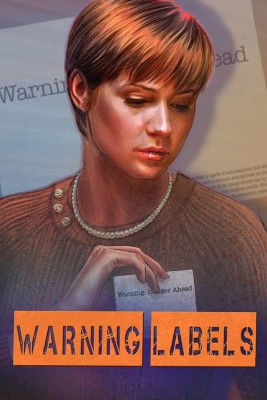
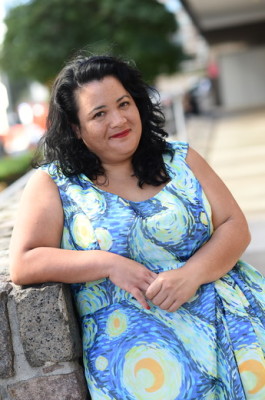
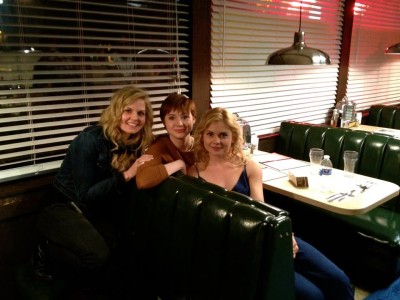
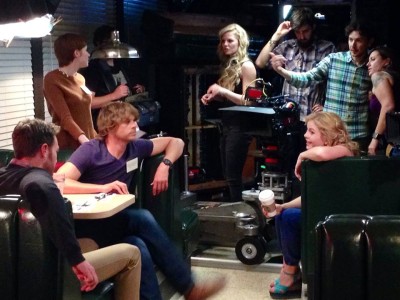
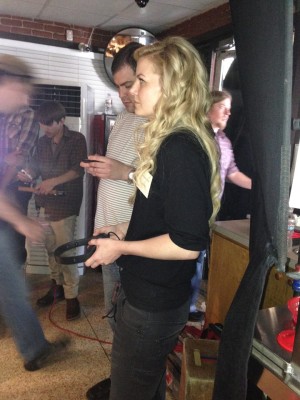
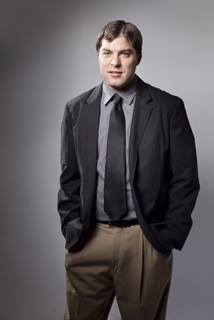
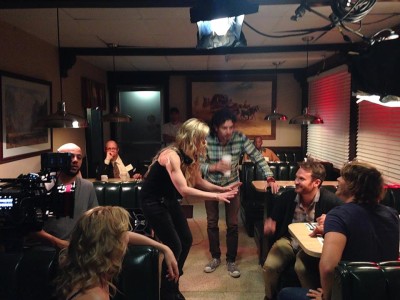
I love Jennifer Morrison.